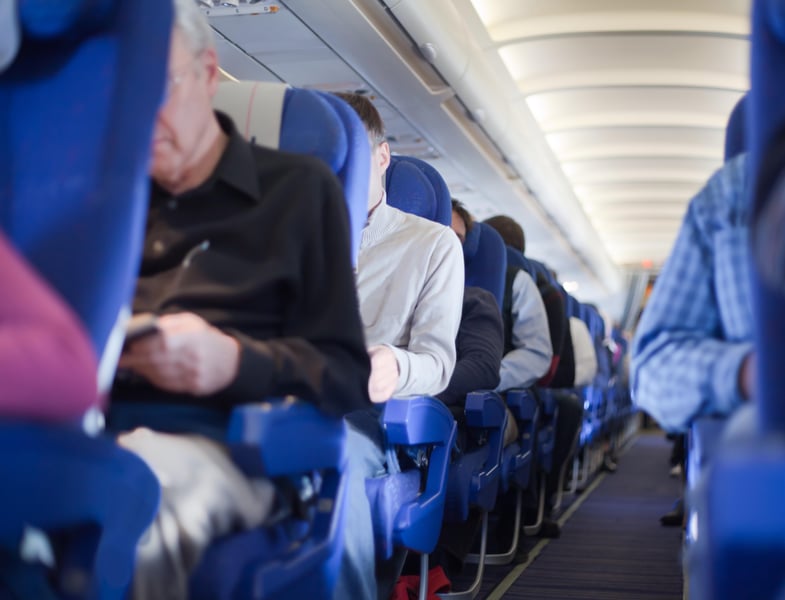Manténgase sano!

- Posted March 25, 2022
Health Experts Support End to Masks, Tests for Air Travel
U.S. airline companies want an end to mask and COVID testing rules for air travel -- and many top infectious disease and public health experts agree with them.
The chief executives of the country's largest airlines asked President Joe Biden in a letter this week to let federal mask mandates at airports and on planes lapse next month, along with COVID-19 testing requirements for international travelers.
The American Public Health Association (APHA) is "supportive of this request," said its executive director, Dr. Georges Benjamin.
"We think that as you look at the trajectory of the disease in the United States, it's on a downward slope," he said. "There's no question that they can lift the mask mandate."
Experts also see little reason to keep testing international travelers for COVID. Right now, they must show proof they tested negative no more than one day before their trip or recovered from a COVID infection no more than 90 days earlier.
"For highly transmissible respiratory viruses, international transportation restrictions don't work very well," said Dr. William Schaffner, medical director of the Bethesda, Md.-based National Foundation for Infectious Diseases. "These viruses are too highly transmissible, and they can come in with people during the incubation period when the individual is perfectly well and cannot be detected."
Experts noted that rising vaccination rates, combined with high infection rates from Omicron, mean that many Americans have enough immunity against COVID to keep them out of the hospital.
In addition, COVID risks from air travel simply haven't been as dire as once thought.
"Outbreaks based on airplanes have been essentially nil," Benjamin said. "There are people who have gotten infected, but in general there have not been large outbreaks, which was the big fear."
Schaffner considers the airlines' request "entirely reasonable."
"I'm cautious usually, but I've been a little puzzled why this remnant has remained," Schaffner said. "For many other interactions indoors, the recommendations now are that people can remove their masks and get back to a new normal way of interacting. I haven't quite understood why transportation -- airlines, railroads, buses and the like -- haven't fit into that same mode of thinking."
In their letter, the airline executives noted there has been a "persistent and steady decline" in COVID hospitalizations and death rates.
A federal requirement that people wear masks on airplanes, buses, ferries and other types of public transportation had been set to expire this month but was recently extended until April 18.
"It makes no sense that people are still required to wear masks on airplanes, yet are allowed to congregate in crowded restaurants, schools and at sporting events without masks, despite none of these venues having the protective air filtration system that aircraft do," the airline executives' letter said.
Dr. Amesh Adalja, a senior scholar with the Johns Hopkins Center for Health Security in Baltimore, agrees.
"I think that air travel is probably one of the lower-risk COVID-19 activities to people engage in," he said. "Masks and testing aren't required -- or even recommended -- for many more activities that have a higher risk of COVID-19 transmission than riding on a highly air filtered airplane."
COVID testing for international travelers also hasn't seemed to pan out, Schaffner noted, given that variants from other countries inevitably end up here.
It was never a perfect system anyway, said Dr. Aaron Glatt, chief of infectious diseases at Mount Sinai South Nassau in Oceanside, N.Y.
"There really is no way to make it perfect unless you make it very stringent," Glatt said. "And we were never that stringent."
At the same time, the experts support and encourage people who want to continue masking on planes, particularly if they are at high risk for severe COVID.
"Individuals may choose to hold a higher personal standard," Glatt said. "Certainly people that are immunocompromised, that should give them additional concern or thought as to whether they should make that trip."
Adalja agreed.
"If people want to continue to voluntarily wear masks, they can," Adalja said. "One-way masking, with high-quality masks, is effective and people can similarly self-test as they wish. The government should not be forcing these measures on airline companies."
More information
The U.S. Transportation Security Administration has more about its COVID-19 response.
SOURCES: Georges Benjamin, MD, executive director, American Public Health Association, Washington, D.C.; William Schaffner, MD, medical director, National Foundation for Infectious Diseases, Bethesda, Md.; Amesh Adalja, MD, senior scholar, Johns Hopkins Center for Health Security, Baltimore; Aaron Glatt, MD, chief, infectious diseases, Mount Sinai South Nassau, Oceanside, N.Y.






